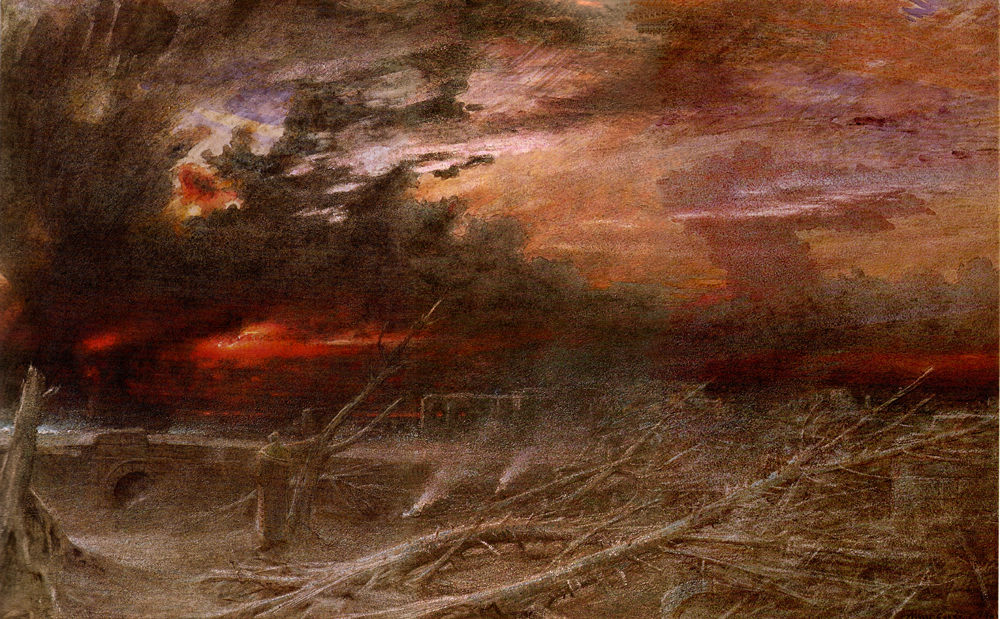The Ethics of Apocalypticism
Jesus is usually thought of as a major ethical teacher (the famous slogan “What would Jesus do” is a major testament to this), but most of his preaching was not so much about how we should live, but rather, what will happen in the upcoming apocalypse. Yes, he gave a lot of ethical advice, but as Albert Schweitzer frequently reminded us, his ethics must always be understood in the context of apocalypticism. Jesus was, above all, a doomsdayer.
Does a doomsdayer stand on firm moral ground? Is apocalypticism good, bad, or ethically neutral? The answer, alas, is complicated. Historians of religion usually tell us that apocalypticism is rampant in times of oppression. This was certainly the case of Jesus during the Roman occupation of Judea. Oppressed peoples do their best to transform society, but unfortunately, all too often they find out that they just can’t be freed from the yoke; oppressors are too powerful.
Yet, they don’t give up. They cling to the hope that, sometime in the imminent future, the score will be settled. The last shall be first. Earthquakes, famines, wars and devastation will come, but it is all part of a divine plan for justice. Apocalyptic preachers tell their audiences to endure a little bit more, as God is about to intervene. Run the extra mile.
From this perspective, apocalypticism is ethically sound. Apocalyptic preachers are, in a sense, the voice of the oppressed. And, given their sense of urgency, they frequently reinforce ethical awareness, even if not in a very philosophical manner (religious doomsdayers will usually teach people to be good, not on the grounds of some Kantian moral duty, but rather, to avoid the horrors of hell).
On the other hand, apocalypticism is a form of escapism. Although some branches of theology believe that Jesus’ descriptions of the “Kingdom of God”, and the book of Revelation’s images of the New Jerusalem, are not literal, the fact is that most apocalyptic preachers (probably including Jesus himself) believe all that stuff to the letter. Ethically speaking, fantasy is not a proper way to solve problems. Apocalypticisim can either incentivize oppressed people to just sit and wait for some liberation to come from the heavens (and of course, it won’t), or worse still, it can foster delusions of divine aid that ultimately lead to suicidal plots against much more powerful adversaries.
In our age, apocalypticism has become especially dangerous. Taking religious apocalyptic literature too seriously can increase the sense of being oppressed, even when that is not the case. Apocalypticism thus breeds paranoia (“the powers that be are out to get us”), a typical feature of American politics, as Richard Hofstadter powerfully argued in The Paranoid Style in American Politics.
And, given apocalypticism’s escapist nature, unsatisfied (though not necessarily oppressed) people may be too eager for the end times to come. The real danger is that, in their boredom, they just cannot wait. Thus, they do their best to speed it up. For years, political analysts have been worried about the influence of apocalyptic lobbies in high spheres of power, pushing for a nuclear showdown in the Middle East. According to their school of eschatology, this would hasten the Second Coming, followed by blissful eternity.
There is, as well, a secular version of apocalypticism. And, unlike its religious counterpart, it does not seem to be so delusional. Is it any more (or less) ethical? Again, the answer is twofold. Humanity certainly should not take its existence for granted, and secular doomsdayers act ethically by so reminding us. There are many existential risks to our species: asteroid collisions, nuclear war, nanotechnological disasters, pandemics, etc. Scientists such as Martin Rees warn us about the dangers lying ahead, and what we can do about it. We should be grateful to them.
But, then again, secular doomsdayers can blow things out of proportion, and induce the same collective hysteria that religious apocalyptic preachers have produced for centuries. Back in 1999, there was a lot of hype about the Y2K bug, and of course, nothing happened. Global warming, although real, may not be as imminent and as serious a threat as we have been led to believe. Nuclear alarmism may be counterproductive. And so on.
And, very much as religious apocalypticism, its secular variant may be an unhealthy form of escapism. Take, for instance, the recent trend of Silicon Valley millionaires, as reported last month on The New Yorker by Evan Osnos. Tech executives are worried that the widening gap between rich and poor may make the existing social order collapse. They know especially well that, in the digital age, we are very vulnerable to all sorts of sabotages and shutdowns. But, instead of working for a common-sense solution (such as doing their best to improve social justice), some of these Silicon Valley execs are embracing the apocalyptic ideology of survivalists (or “preppers,” as they are also known thanks to the TV show). They are now building well-provisioned condos away from civilization, their rationale being that, when revolutionary doomsday comes, they will be safe in their apocalyptic refuges.
This is clearly another version of “white flight” (the migration of middle class white Americans to the suburbs), albeit with an apocalyptic twist. Evangelicals embrace the rapture, and hope to be taken away from a life that does not fully satisfy them. Now, tech execs are embracing their own rapture; they want to be taken away from their coexistence with the poor, even if that leans living in the uncivilized wilderness. Poverty afflicts the poor, but huge inequalities also disturb the rich with guilt and anxiety. Apocalypticism is an opportunity to understand the increasing danger of inequality. Unfortunately, survivalism is not a solution to this preventable apocalypse.





